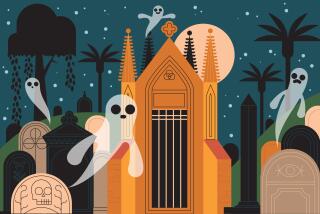For All Its Urban Horrors, L.A. Is Still Home Sweet Home
- Share via
We all know the laundry list of our city’s dirty clothes: smog, litter, overcrowding, crime, drugs, drive-by shootings, poor schools, bad housing, poverty, the homeless. . . .
There are others, but those are enough to give us a bad name. Not surprisingly, in the face of such blight, more persons are leaving the state than are coming in--reversing the trend of a century.
A year or more ago I printed a letter from Jean Israel, a woman who had moved from Los Angeles with her husband, Charles, to Hamilton, in Montana’s Bitterroot Valley.
As a result of that column, she now writes, she has received many phone calls from Angelenos wanting to know about life in Hamilton. Parts of the column were reprinted in the local paper, and Mrs. Israel has also received complaints from locals who object to anything that might induce more Angelenos to move there.
“Hamilton,” she writes, “reminds me of simpler times living in California before the hustle, bustle and high stress of large urban living began to invade my inner peace and sense of space. . . . With the great majestic beauty of the Rockies in which this valley is set and the small-town feeling life has become sweet again for us. . . . “
In an essay sent me by her mother, Bonnie Jeanne Winter complains in desperation about life in the city: “In a less than two-block walk at lunch I am assailed, yes assailed, by no less than four regular indigents.” She is assailed by an indigent when she tries to do business at an ATM. Another insists on cleaning her windshield. She tells him, “Please leave me alone so I can drive out of this insane city.”
In a column about our recent stay in Park City, Utah, I mentioned driving through the squeaky-clean streets of Provo, a comment for which Andrew A. Watson of Mentone takes me to task.
“True, Provo is a neat, tidy little town. But your unrestrained astonishment at that fact betrays a provincialism that surprises and disappoints me. Obviously, you have become deadened to the filth that pervades Ellay and have come to see it as normal. It isn’t. Provo is fairly typical of life anywhere outside Ellay.”
(Provo happens to be the town we drove through. I described it as I saw it. I did not suggest that it was unique.)
Possibly we have become insensitive to the horrors of Los Angeles. My wife and I have lived here 46 years and we stay here out of choice.
Of course we live on Mt. Washington, which is above the strife. In 1910, Mt. Washington was discovered by a real-estate developer and was soon described in the Mt. Washington Eagle as a place where “the man of even modest wealth may build his home on a charming sun-kissed eminence that commands a vista of snow-capped mountains, several cities and the blue ocean--not surpassed on either hemisphere.”
Even allowing for advertising hyperbole, Mt. Washington is a nice place to live--far from the madding crowd.
Still, there are signs of encroaching urban problems. Not long ago vandals broke my car window. The other night our doorbell rang and I found a disturbed man at the door. He was breathing hard. His clothes were disheveled. He said he was jogging down the hill just above our house when a car with three or four men in it stopped, showed him a gun and asked for his wallet. He ran back a few feet, jumped a fence and tumbled into a brushy canyon. The car sped away. He wanted to use our phone to call his wife.
So we are not immune.
My wife works at the Southern California Counseling Center on Pico Boulevard near Fairfax Avenue. Several stores in the neighborhood were gutted in the riots. It often takes her an hour to get home through rush-hour traffic.
Still, we enjoy living in Los Angeles. We have found several nearby restaurants we like. We enjoy the Music Center plaza at night, especially on those nights when the Department of Water and Power has seen fit to leave its fountains on. We enjoy the Philharmonic concerts and the plays at the Mark Taper Forum. We enjoy dining first at Rothschild’s.
True, such amenities are not available to the poor. But a city that has no amenities for the affluent is a city without hope.
You don’t have to be rich to have a pastrami on rye at Langer’s deli at Seventh and Alvarado streets or a chicken salad at Musso & Frank on Hollywood Boulevard. Walking by the stalls on the Venice ocean promenade is free. So is Griffith Park. They can’t even stop you from walking down Rodeo Drive. You can pretend to be rich. I do it all the time.
Almost every night we see a sunset from our kitchen windows. And it is sometimes given a gorgeous magenta cast by the smog.
More to Read
Sign up for Essential California
The most important California stories and recommendations in your inbox every morning.
You may occasionally receive promotional content from the Los Angeles Times.










